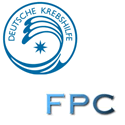Familial pancreatic cancer syndromes
McFaul CD, Greenhalf W, Earl J, Howes N, Neoptolemos JP, Kress R, Sina-Frey M, Rieder H, Hahn S, Bartsch DK; European Registry of Hereditary Pancreatitis and Familial Pancreatic Cancer (EUROPAC); German National Case Collection for Familial Pancreatic Cancer (FaPaCa). ![]()
Anticipation in familial pancreatic cancer. Gut. 2006 Feb;55(2):252-8. Epub 2005 Jun 21. PMID: 15972300
Bartsch DK, Kress R, Sina-Frey M, Grutzmann R, Gerdes B, Pilarsky C, Heise JW, Schulte KM, Colombo-Benkmann M, Schleicher C, Witzigmann H, Pridohl O, Ghadimi MB, Horstmann O, von Bernstorff W, Jochimsen L, Schmidt J, Eisold S, Estevez-Schwarz L, Hahn SA, Schulmann K, Bock W, Gress TM, Zugel N, Breitschaft K, Prenzel K, Messmann H, Endlicher E, Schneider M, Ziegler A, Schmiegel W, Schafer H, Rothmund M, Rieder H. ![]()
Prevalence of familial pancreatic cancer in Germany. Int J Cancer. 2004 Jul 20;110(6):902-6. PMID: 15170674
Hahn SA, Greenhalf B, Ellis I, Sina-Frey M, Rieder H, Korte B, Gerdes B, Kress R, Ziegler A, Raeburn JA, Campra D, Grutzmann R, Rehder H, Rothmund M, Schmiegel W, Neoptolemos JP, Bartsch DK. ![]()
BRCA2 germline mutations in familial pancreatic carcinoma. J Natl Cancer Inst. 2003 Feb 5;95(3):214-21. PMID: 12569143
Bartsch DK, Sina-Frey M, Lang S, Wild A, Gerdes B, Barth P, Kress R, Grutzmann R, Colombo-Benkmann M, Ziegler A, Hahn SA, Rothmund M, Rieder H. ![]()
CDKN2A germline mutations in familial pancreatic cancer. Ann Surg. 2002 Dec;236(6):730-7. PMID: 12454511
Rieder H, Sina-Frey M, Ziegler A, Hahn SA, Przypadlo E, Kress R, Gerdes B, Colombo Benkmann M, Eberl T, Grutzmann R, Lorken M, Schmidt J, Bartsch DK. ![]()
German national case collection of familial pancreatic cancer - clinical-genetic analysis of the first 21 families. Onkologie. 2002 Jun;25(3):262-6. PMID: 12119461
"German National Case Collection for Familial Pancreatic Cancer" ![]()
"The European Registry Of Hereditary Pancreatitis And Familial Pancreatic Cancer" ![]()
INTRODUCTION
The elucidation of hereditary factors in the aetiology of human cancer is of great scientific and clinical importance. The definition of many tumour syndromes based on clinical phenotypes and the collection of families fulfilling these criteria has been instrumental in advancing this field. This, together with many technological advances has led in the past ten years to the discovery of alterations in distinct genes at the germline level, helping to define some syndromes by their genetic alterations. This knowledge has already been transformed for some of the syndromes into the clinical management of patients with a hereditary cancer risk. We are now able to identify for a number of hereditary tumour syndromes family members at risk using predictive genetic testing. This allows for the first time the application of preventative screening technology such as colonoscopy or mammography specifically for patients at risk due to a positive germline mutation analysis and selectively exclude members from screening if they do not carry the mutation identified in a given family.
There are a number of tumour syndromes, which include an increased incidence of pancreatic cancer, which is incurable unless detected at a very early stage. Pancreatic cancer represents 2% of all new cancer cases but leads to 5% of all cancer deaths (1). Due to intense research activities in the past decade a number of genetic alterations have been identified that are responsible for the development of pancreatic ductal adenocarcinoma. This progress together with the identification of several hereditary pancreatic tumour syndromes has more recently led to the formation of national and international research activities focusing on the molecular pathogenesis of hereditary risk factors for pancreatic cancer.
RESEARCH GOALS
This collaborative research effort supported by the German Cancer Foundation (Deutsche Krebshilfe) aims at collecting families with an increased incidence of ductal pancreatic adenocarcinoma which are therefore suspected to suffer from a familial pancreatic cancer syndrome. Families will be analyzed for environmental- and other risk factors, such as smoking habits. Furthermore, these families will be analyzed for germline mutations in genes with a potential relevance to PDAC development hoping that in the future predictive genetic testing may become feasible for these families. Unfortunately, in most cases the gene responsible for FPC is still unknown and testing of other candidate genes has not (apart from BRCA2 mutations) revealed any other mutations. Therefore, in collaboration with EUROPAC linkage studies will be performed for the identification of new disease genes in these families. Lastly, early detection screening programs for FPC families will be evaluated under strict study criteria.
CLASSIFICATION OF HEREDITARY PANCREATIC CANCER SYNDROMES
To date there is much confusion in the literature about the use of the term familial or hereditary pancreatic cancer. The classification proposed herein is mostly syndrome-specific as this is a useful means of classification for the different forms of hereditary pancreatic cancer. There are a number of syndromes, which are not primarily defined by pancreatic cancer risk, but nevertheless the risk is increased as part of the clinical phenotype. These syndromes include familial atypical multiple mole melanoma (FAMMM)(2), Peutz-Jeghers syndrome (PJS)(3, 4, 13), hereditary pancreatitis (HP)(5, 6), hereditary non-polyposis colorectal carcinoma (HNPCC)(7), familial breast and ovarian cancer (FOBC)(8), cystic fibrosis (CF)(9), ataxia-telangiectasia (AT)(10) and familial adenomatous polyposis (FAP)(11). In contrast, the term familial pancreatic cancer (FPC) is currently restricted by many researchers in the field to families with at least two first-degree relatives with pancreatic ductal adenocarcinoma in the absence of an accumulation of other cancers or diseases that are known to be familial (12).
REFERENCES
- Jemal A, Murray T, Samuels A, Ghafoor A, Ward E, Thun MJ. Cancer statistics, 2003. CA Cancer J Clin. 53, 5-26 (2003).
- Lynch HT, Fusaro RM. Pancreatic cancer and the familial atypical multiple mole melanoma (FAMMM) syndrome. Pancreas. 6, 127-31. (1991).
- Giardiello FM, Brensinger JD, Tersmette AC, Goodman SN, Petersen GM, Booker SV, Cruz-Correa M, Offerhaus JA. Very high risk of cancer in familial Peutz-Jeghers syndrome. Gastroenterology. 119, 1447-53. (2000).
- Giardiello FM, Welsh SB, Hamilton SR, Offerhaus GJ, Gittelsohn AM, Booker SV, Krush AJ, Yardley JH, ; Luk GD. Increased risk of cancer in the Peutz-Jeghers syndrome. N Engl J Med. 316, 1511-4. (1987).
- Lowenfels AB, Maisonneuve P, DiMagno EP, Elitsur Y, Gates LK, Jr., Perrault J. Hereditary pancreatitis and the risk of pancreatic cancer. International Hereditary Pancreatitis Study Group. J Natl Cancer Inst. 89, 442-446 (1997).
- Howes N, Lerch MM, Greenhalf W, Stocken DD, Ellis I, Simon P, Truninger K, Ammann R, Cavallini G, Charnley RM, Uomo G, Delhaye M, Spicak J, Drumm B, Jansen J, Mountford R, Whitcomb DC, Neoptolemos JP. Clinical and genetic characteristics of hereditary pancreatitis in Europe. Clin Gastroenterol Hepatol. 2, 252-61 (2004).
- Lynch HT, Smyrk TC, Watson P, Lanspa SJ, Lynch JF, Lynch PM, Cavalieri RJ, Boland CR. Genetics, natural history, tumor spectrum, and pathology of hereditary nonpolyposis colorectal cancer: an updated review. Gastroenterology. 104, 1535-49 (1993).
- Tulinius H, Olafsdottir GH, Sigvaldason H, Tryggvadottir L, Bjarnadottir K. Neoplastic diseases in families of breast cancer patients. J Med Genet. 31, 618-21 (1994).
- Malats N, Casals T, Porta M, Guarner L, Estivill X, Real FX. Cystic fibrosis transmembrane regulator (CFTR) DeltaF508 mutation and 5T allele in patients with chronic pancreatitis and exocrine pancreatic cancer. PANKRAS II Study Group. Gut. 48, 70-4. (2001).
- Swift M, Chase CL, Morrell D. Cancer predisposition of ataxia-telangiectasia heterozygotes. Cancer Genet Cytogenet. 46, 21-7 (1990).
- Offerhaus GJ, Giardiello FM, Krush AJ, Booker SV, Tersmette AC, Kelley NC, Hamilton SR. The risk of upper gastrointestinal cancer in familial adenomatous polyposis. Gastroenterology. 102, 1980-2 (1992).
- Bartsch DK. Familial pancreatic cancer. Br J Surg. 90, 386-7 (2003).
- N Hearle, V Schumacher, FH Menko, S Olschwang, LA Boardman, JJ Gille, JJ Keller, AM Westerman, RJ Scott, W Lim, JD Trimbath, FM Giardiello, SB Gruber, GJ Offerhaus, FW de Rooij, JH Wilson, A Hansmann, G Moslein, B Royer-Pokora, T Vogel, RK Phillips, AD Spigelman and RS Houlston: Frequency and spectrum of cancers in the Peutz-Jeghers syndrome. Clin Cancer Res , 12(10), 3209-3215 (2006).



